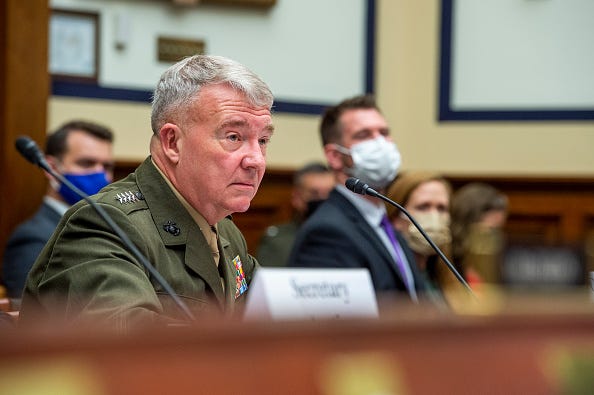
On Tuesday, two U.S. generals shared with lawmakers that President Joe Biden had been advised to keep several thousand troops in Afghanistan, contradicting what the president said in August about no one warning him.
The generals, who were under oath, gave testimony that has pitted them against Biden, who has been criticized for the nation's messy departure from Afghanistan. The departure ended with 13 American service members' deaths, visuals of people clinging to airplane wings in a desperate attempt to flee and thousands of Afghan refugees being removed from the country.
Gen. Kenneth "Frank" McKenzie, the commander of the U.S. Central Command, shared with the Senate Armed Services in a hearing on Tuesday that he advised the president to maintain a small force of 2,500 troops in the war-torn country earlier this year.
In the fall of 2020, under the Trump Administration, he said he advised keeping a force of 4,500 troops.
McKenzie also said that he would not share his "personal recommendation" with the president while advising him.
However, he went on to say his opinions shaped how he made his recommendations about how withdrawing U.S. forces "would lead inevitably to the collapse of the Afghan military forces and, eventually, the Afghan government."
McKenzie also acknowledged that he talked with Biden about Gen. Scott Miller's recommendation to leave a few thousand troops on the ground, which Miller detailed in closed testimony last week, Politico reported.
"I was present when that discussion occurred, and I am confident that the president heard all the recommendations and listened to them very thoughtfully," McKenzie said.
This directly contradicts what Biden said in an ABC interview on Aug. 19 that "no one" that he "can recall" advised him to keep a force of about 2,500 troops on the ground in Afghanistan.
Biden was asked, "So no one told — your military advisers did not tell you? No, 'we should just keep 2,500 troops.' It's been a stable situation for the last several years. We can do that. We can continue to do that"?
Biden answered with, "No. No one said that to me that I can recall."
U.S. General Mark Milley was also questioned and shared in his statement that his advice was not sought out until after Aug. 25, which led to Rep. Tom Cotton grilling him about not making more of an effort to advise the president.
Cotton said that he understands Milley does not make the decisions, but he questioned why Milley has not resigned since the "botched" departure.
Milley responded, saying that it would be a political act for him to resign in protest of the president not heeding his advice.
"My job is to provide advice," Milley said.
He went on to say, "the president doesn't have to agree with that advice. He doesn't have to make those decisions just because we're generals."
Both generals were also asked if the war on terror was over, to which they responded no.
The president has not yet commented on the statements from McKenzie or Milley that he was advised to leave troops in Afghanistan.



